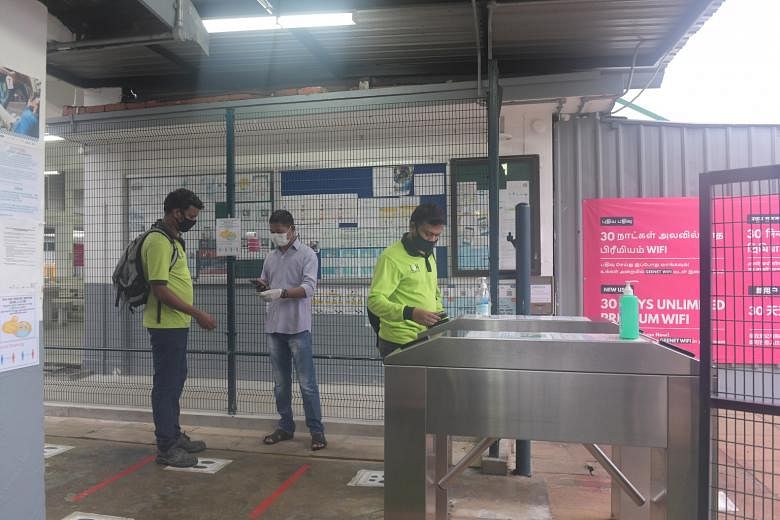Construction worker Arockia Rajan Sasi, 32, uses his mobile phone to scan a SafeEntry QR code posted outside a third-floor Housing Board unit in Yishun to log his entry into his workplace.
Once inside the jumbo flat, he writes his name, contact number and body temperature, among other details, on a sign-in sheet pasted on a pillar before starting his work day.
Workers who stay in dormitories need to comply with these health and safety measures before they can start working, reporters observed during a media visit over the weekend.
But that is not all. These workers have to follow a set of precautionary measures before they leave their dormitories for work too.
These new and stricter procedures are meant to stave off Covid-19 before residents can be given the all-clear from the ministry to resume work.
At Central Staff Apartments in Serangoon, where Mr Sasi stays with his colleagues, workers are taught to fire up the national contact tracing app TraceTogether before they leave for work.
They must also note down their body temperature, heart rate and oxygen saturation through an app called FWMOMCare, using a thermometer and an oximeter. The app will also ask them if they are suffering from any Covid-19 symptoms such as cough, sore throat or a runny nose.
FWMOMCare uses GPS or QR codes to verify if workers are indeed staying in the dormitories that are registered as their residence.
The workers also have to check SGWorkpass - another app - to confirm if they, their companies and the dormitories they are staying in have received the ministry's all-clear to resume work.
Speaking through a ministry translator, Mr Sasi told reporters that the new routine of taking his temperature twice daily and using hand sanitisers, among other measures, "is definitely a little difficult to adhere to".
One of the most difficult changes involved breaking the cultural habit of having meals together, he added.
Mr Sasi said: "We used to eat together, but now we try to have distance while we are eating. We eat only food that is provided to us. We don't go downstairs to buy food, and we will use hand sanitisers before we start working again."
He said the measures were new, "but as the Covid-19 situation calms down, I hope it gets better".
Central Staff Apartments customer service manager Eleen Lian said the dormitory has created demonstration videos, among other initiatives, to teach residents how to use the different apps.
Employers have been cooperative because they also want their workers to be safe, healthy and able to start work soon, she added.
About 430 workers from 44 employers stay in the purpose-built dormitory now, down from some 900 that stayed there before.
The rest have moved into temporary accommodation provided by the Government because they are in essential services and continued working during the circuit breaker period.
Ms Lian said her firm is waiting for clearer guidelines on how to start taking in more residents.
Mr Sasi's employer, Mr James Sim, who runs L&H Reno, said that workers have not complained that learning the different apps they have to use is difficult.
"Some of the workers might even be more tech-savvy than I am," he said.
He has 14 workers staying in Central Staff Apartments, divided between two rooms. His main task has been to ensure that workers staying in the same room work at the same site and do not mix with those in other rooms.
Mr Sasi and his two colleagues returned to the jumbo flat in Yishun on Saturday. It was their first time back since they stopped working there two months ago. Mr Sim's company had begun demolition works in the unit before the circuit breaker period kicked in.
Mr Sasi, who has been working in Singapore for 10 years, said: "We have been under shutdown for two months, so I'm very relieved that I'm working... and breathing fresh air. I can be out of the dormitory at last."
SEE HOME












